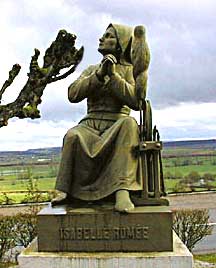
Isabelle Romeé

Isabelle Romeé or Isabelle d'Arc (born circa 1377; died November 28, 1458) was the mother of Joan of Arc and exerted a great Christian influence upon Joan in her formative years. Isabelle's surname Romeé is thought to have been an honorary reference to a pilgrimage she had once made to Rome to the papal city. Whatever the truth about her name, Isabelle was a devout Catholic who nurtured Joan in her faith and the ways of the Church believing it to be her greatest responsibility to Joan. As Joan later described at her trial: "My mother taught me the Pater Noster, Ave Maria, and the Credo. Nobody taught me my belief, if not my mother."
Isabelle was originally from Vouthon, a small town a short distance to the west of Domremy. She married Jacques d'Arc and together they raised a family that included three sons and two daughters one of which was Joan of Arc. Isabelle was just a simple peasant and years later one of Joan's godmothers described Joan's parents as: "Simple labourers, honest in their poverty, for they were of small means." One of Joan's friends when she was growing up also stated: "From my childhood I knew Joan the Maid who was born at Domremy to Jacques d'Arc and Isabelle, husband and wife, honest and decent farmers and true Catholics of good repute."
After Joan's death Isabelle moved to Orleans by 1440 where she received a pension from the people of the city in gratitude for her daughter's deliverance of Orleans in 1429. In 1455 when the trial to overturn Joan's 1431 Trial of Condemnation began Isabelle and her two sons, Pierre and Jean, became the plaintiffs in the case brought before the Church. In what is now known as Joan's Trial of Nullification or Rehabilitation, Isabelle Romee made the following statement to begin the proceedings:
"I had a daughter born in lawful wedlock who grew up amid the fields and pastures. I had her baptized and confirmed and brought her up in the fear of God. I taught her respect for the traditions of the Church as much as I was able to do given her age and simplicity of her condition. I succeeded so well that she spent much of her time in church and after having gone to confession she received the sacrament of the Eucharist every month. Because the people suffered so much, she had a great compassion for them in her heart and despite her youth she would fast and pray for them with great devotion and fervor. She never thought, spoke or did anything against the faith. Certain enemies had her arraigned in a religious trial. Despite her disclaimers and appeals, both tacit and expressed, and without any help given to her defense, she was put through a perfidious, violent, iniquitous and sinful trial. The judges condemned her falsely, damnably and criminally, and put her to death in a cruel manner by fire. For the damnation of their souls and in notorious, infamous and irreparable loss to me, Isabelle, and mine..."
When Joan's original trial was overturned in 1456 and she was declared a martyr by the Church it undoubtedly brought great joy to Isabelle to see her daughter vindicated in this way. Isabelle lived out her final days in Orleans where she was highly regarded and honored as the mother of the "Maid of Orleans" the hero of France.
|